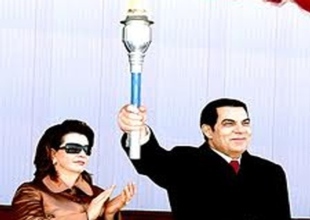Tunisia’s Deposed President — Corrupt, Anti-Democratic, and One of America’s Close Friends
 January 17, 2011 — Across the Middle East and Central Asia, U.S. allies are invariably corrupt dictators, maintained in power by lavish patronage and the military.
January 17, 2011 — Across the Middle East and Central Asia, U.S. allies are invariably corrupt dictators, maintained in power by lavish patronage and the military.
Officially, the Obama administration greeted Tunisia’s “Jasmine Revolution”—named after that country’s national flower—with open arms, calling for free and fair elections as the United States scrambled to get aboard the democratic bandwagon.
However, celebration is restrained in Washington. There’s serious concern about who will take the place of Zine el-Abidine Ben Ali, the corrupt, 74-year-old dictator, who, until the end, was considered an important American ally in the war against terror.
Assuming the Tunisian military actually agrees to hold free elections (not at all a sure thing), will the generals really throw open the doors to all political groups? Nationalists? Islamists? Marxists? Anti-militarists? What forces will roil to the surface after decades of political repression? Will they throw in their lot with America’s war against terror, or join the ranks of those in the Middle East who increasingly see what’s going on as America’s war against Islam?
Washington’s ambivalent view was evident even before the revolution was victorious. In Doha on Thursday, U.S. Secretary of State Hillary Clinton lectured Arab autocrats and others meeting there on the urgent need for reform and an end to corruption if they wanted to save their regimes.
But just a couple of days earlier, as young demonstrators were being gunned down in the cities and towns of Tunisia, when Clinton was asked which side the U.S. was on, she replied that the U.S. was “not taking sides.”
American officials have reason to hesitate. If uprisings were to occur across the Middle East and Central Asia, that could spell disaster for American policy.
There is no way, for instance, that Hosni Mubarak, who has ruled Egypt for 30 years, will permit a democratic opening. Thanks to his ironclad dictatorship, only one group has been able to organize politically, the Islamic radicals. More secular-minded opponents have been co-opted, imprisoned or cowed. The influence of the religious extremists has grown throughout the country. It’s only the military that stands between Mubarak and chaos.
Like a deer frozen in oncoming headlights, Washington seems immobilized. On the one hand, there’s the corrupt, despotic and failing Mubarak. But he’s a friend. On the other hand, free and fair elections would almost certainly bring leaders to power much more virulently anti-Israel and opposed to U.S. policies. Perhaps Washington is hoping for the Egyptian military to step in again to save itself and its privileges—and the U.S.
Elsewhere throughout the region, from Saudi Arabia to Jordan to Yemen to Ethiopia to Afghanistan and Pakistan, the picture seems markedly similar: U.S. allies are invariably corrupt dictators, maintained in power by lavish patronage and the military.
In Lebanon, where the public has had a growing voice in national politics, it’s the anti-American and anti-Israel Hezbollah that has ridden popular acclaim to become the decisive voice in the country.
Popular participation has also benefited America’s most outspoken enemy in Iraq: Moqtada al-Sadr, whose followers fought bloody battles against the U.S. after the invasion. Seemingly vanquished, he has returned from three years in Iran to exercise a decisive political voice in Iraq. He demands the withdrawal of all U.S. troops and bases from his country.
Because of the elections in Iraq, the country that will almost certainly be calling the shots there in the future will not be the United States—but Iran.
Meanwhile, moderates pushing for something akin to democracy and secular rule are losing ground. In Pakistan, the governor of Punjab, Salman Taseer, who had been outspoken in his fight against religious fundamentalism, was killed. The soldier responsible for the murder was showered with rose petals while many of the country’s lawyers—who had once gone to the streets demanding democratic reform—celebrated the murderer as a national hero.
